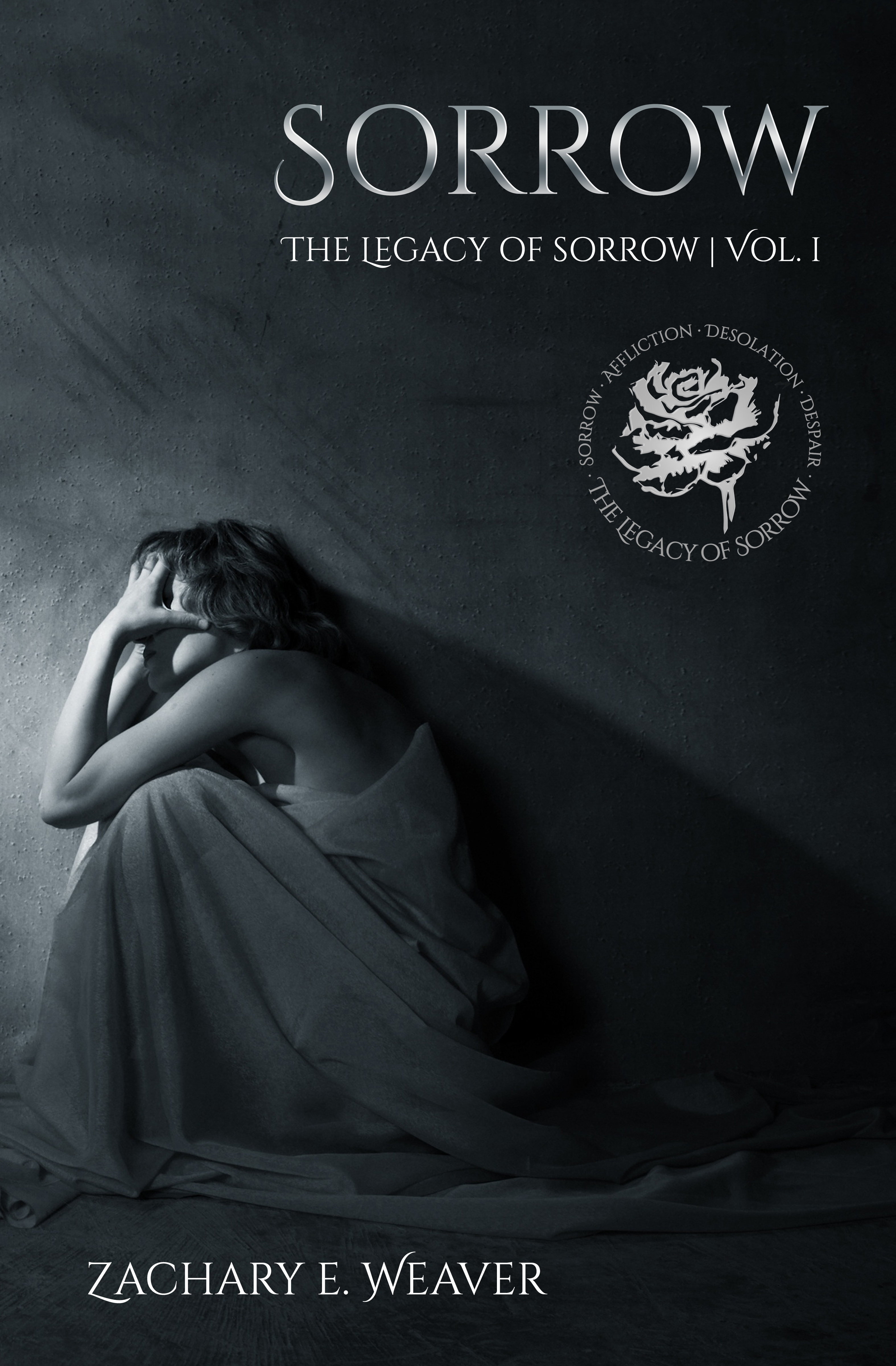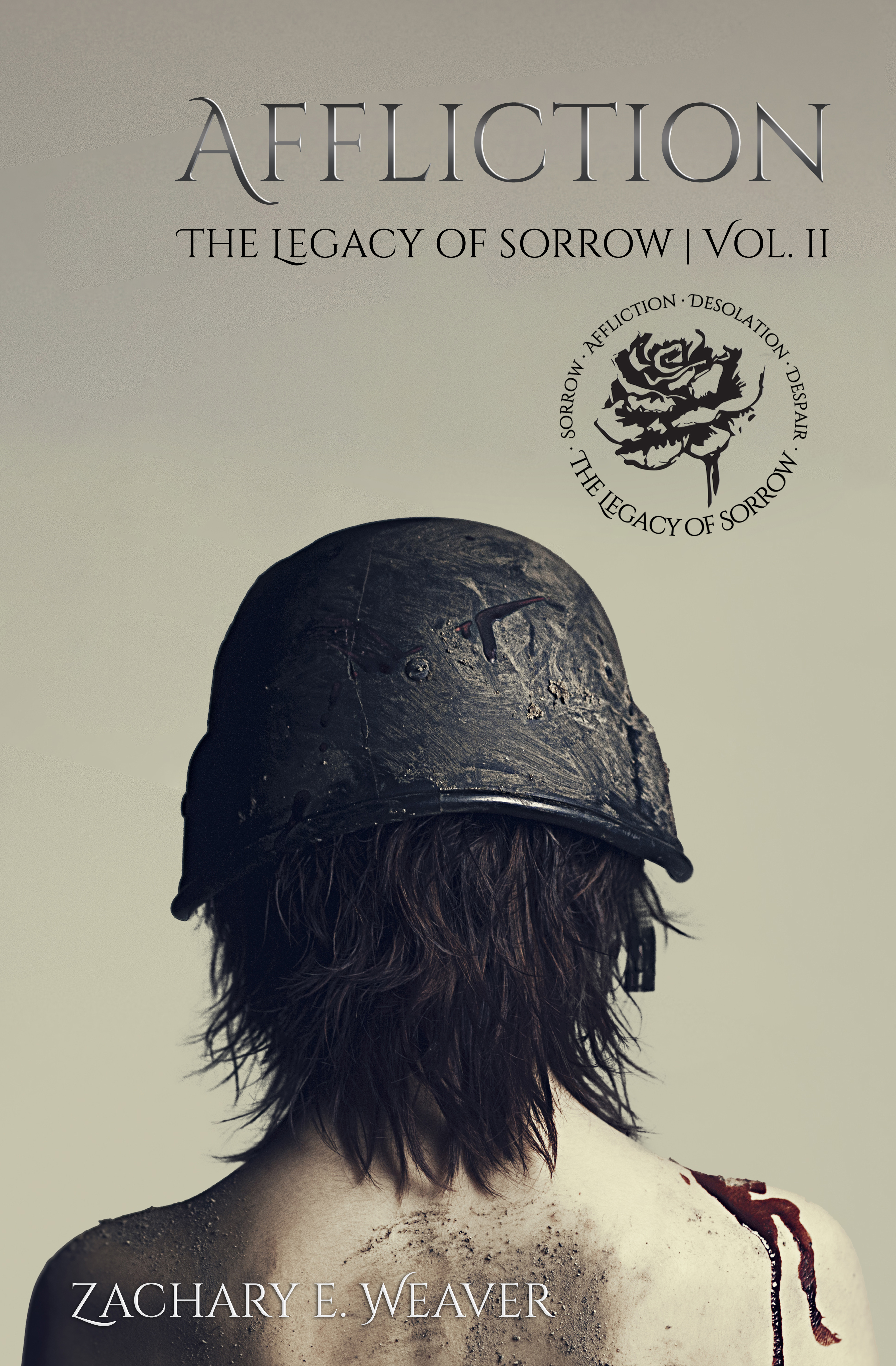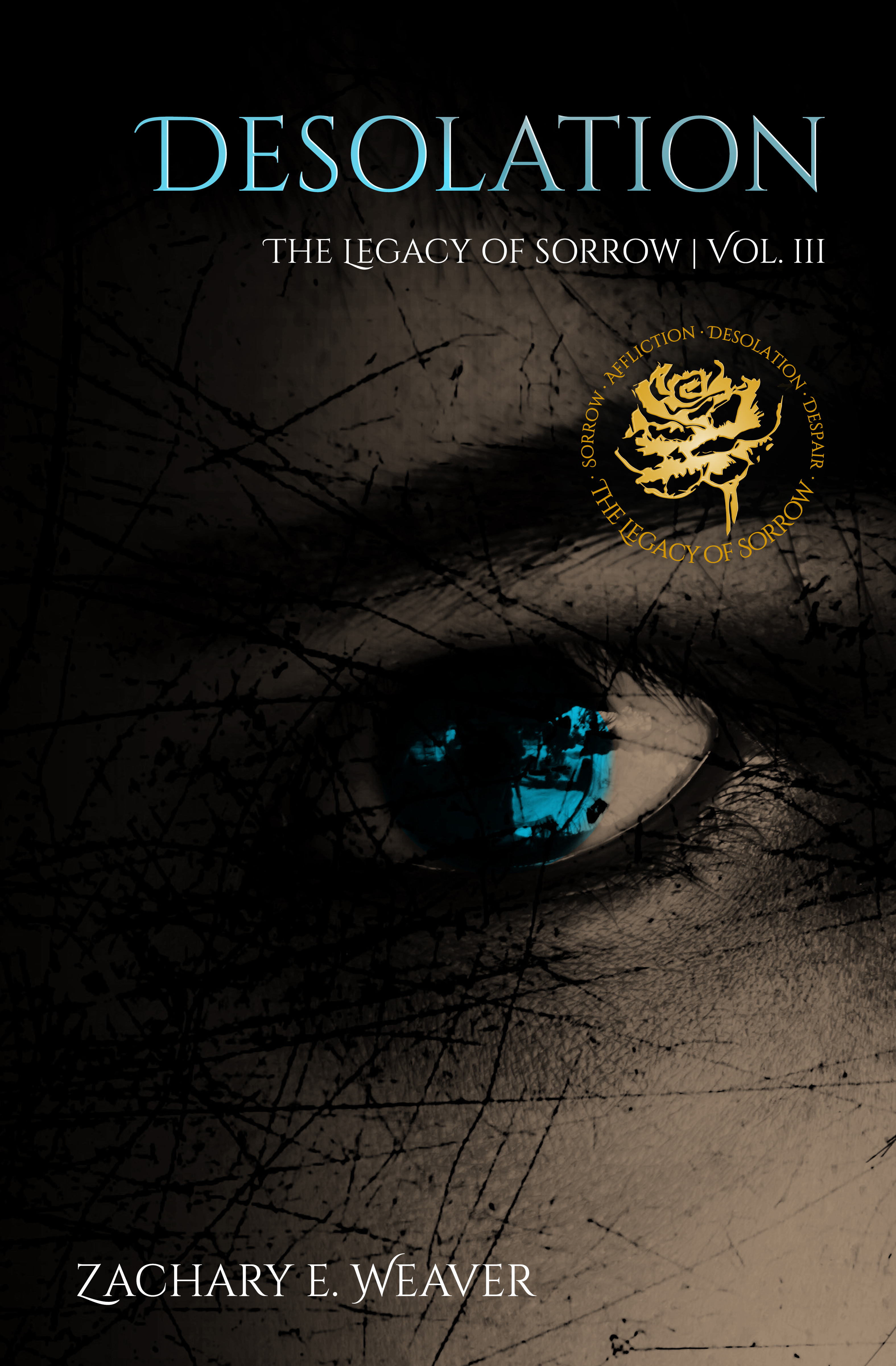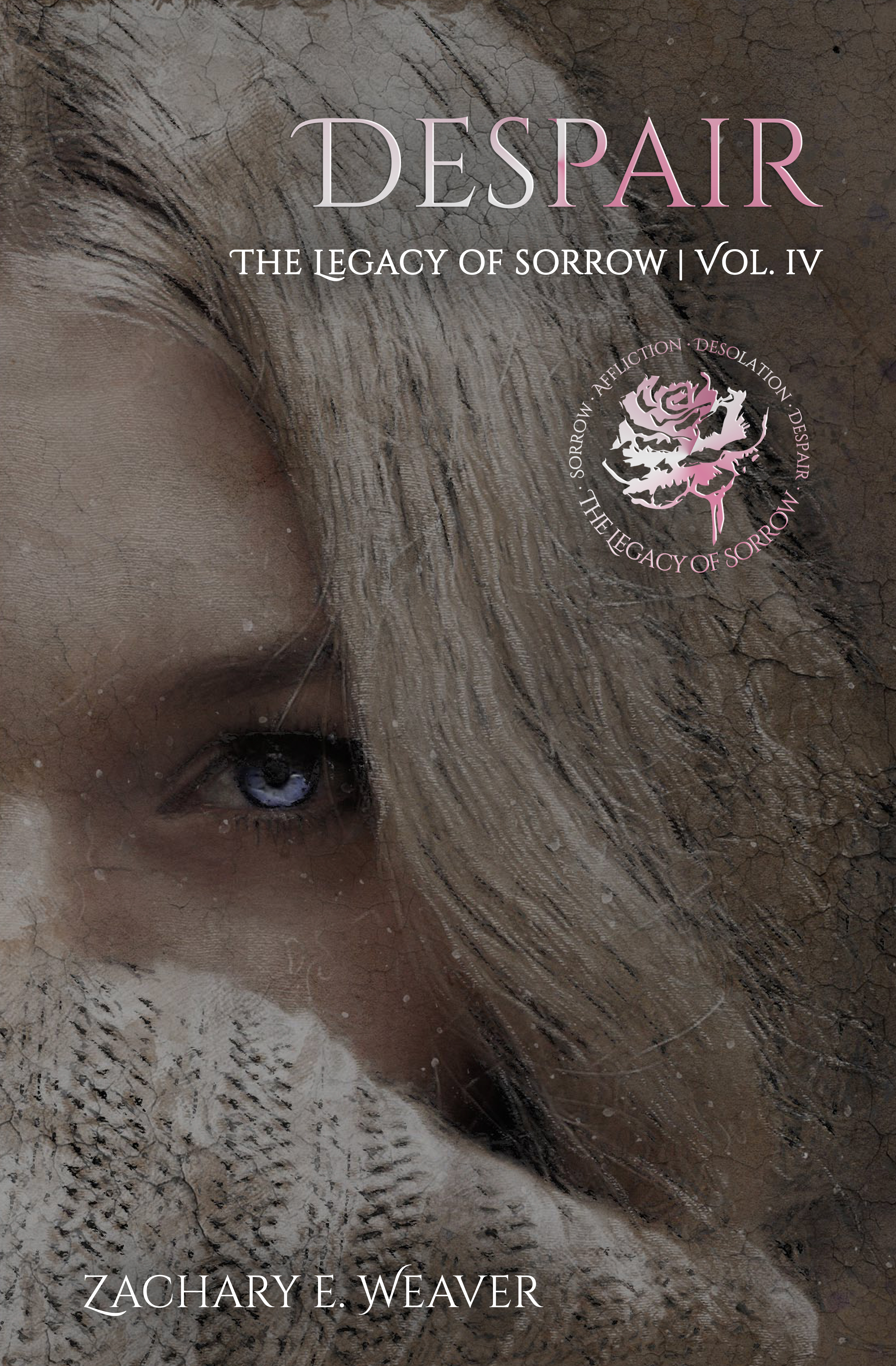the
LegacY
of
SorroW

Meet the author
z
achary started his writing career as young as six years old while writing stapled-together notebook stories about Spyro the Dragon and hand-drawing their front covers. Not long after, one of his poems was selected for print in a collection at eight years old and his first attempt at a novel was finished at eleven years old. With writing being a core part of his life through elementary school, the concept of Sorrow began in middle school during the height of vampire fiction. Wanting to do something completely different from the existing and popular works of that time, Sorrow was started, which evolved until his sophomore year of college when it was released in April of 2017 as part of “The Sorrows Trilogy,” the predecessor to the current series, The Legacy of Sorrow.
After the release of Affliction in 2021, work on Desolation began and encountered problems during production regarding length and the overall scale of the series. The decision was made in 2022 to re-launch the books as a four-part series entitled The Legacy of Sorrow, with the first book (Sorrow) undergoing extensive rewrites to enhance its quality and treating the rest of the series to a rebranding and a new design. The rebranding expanded with a new publisher, growing to include merchandise, custom and commissioned artwork, an Official Fandom Wiki (community partnership), comic books, and more that brought the Sorrowverse closer to reality.
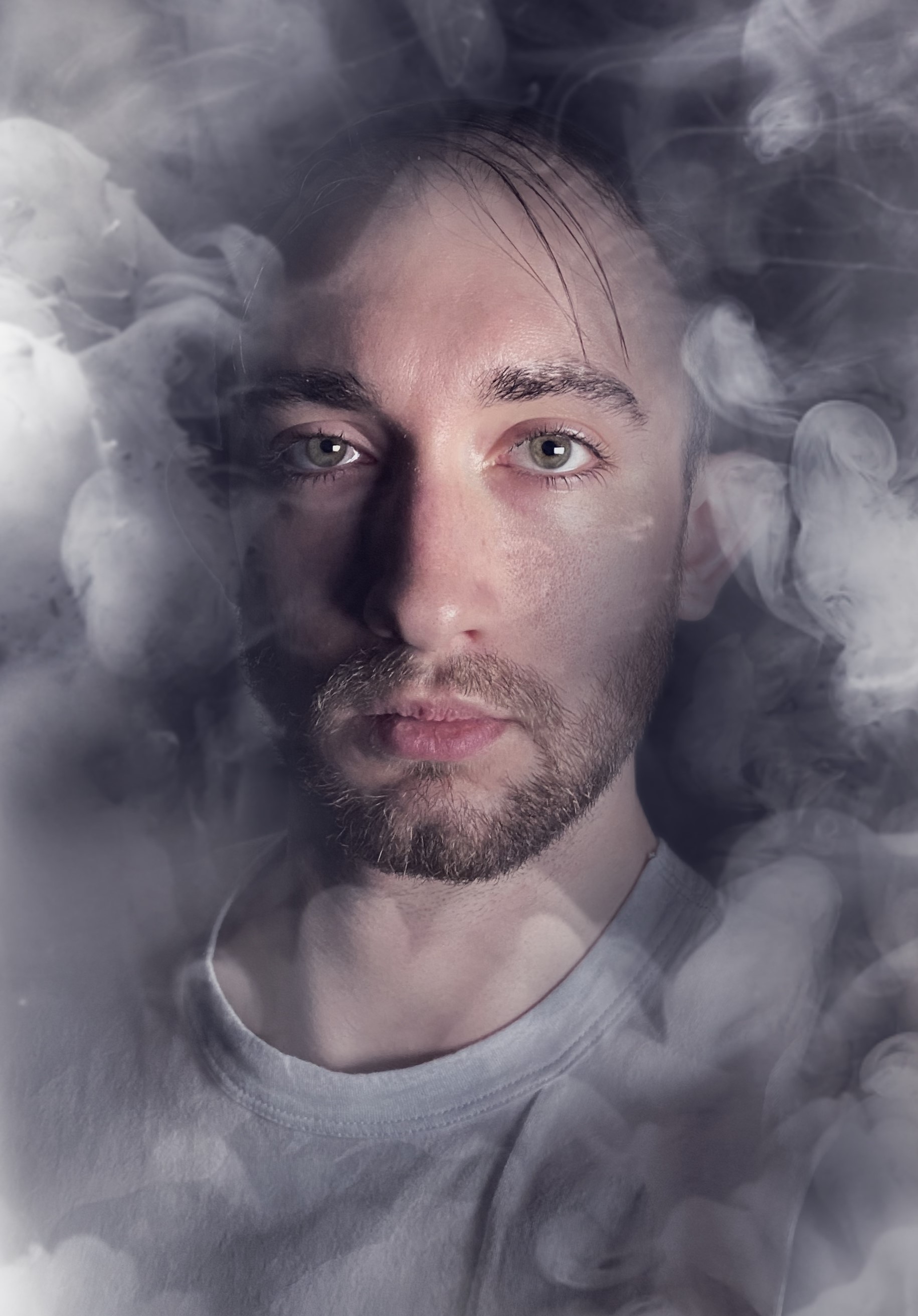
Professional Career and Education
While Zachary is currently a retired Army Staff Sergeant and a graduate student, his career began along a unique and unexpected route. After his high school graduation in 2014 and several months of military training through the U.S. Army to become a Combat Engineer,, Zachary started classes in the spring of 2015 at The Pennsylvania State University for their Nuclear Engineering program with the intent of commissioning as a military officer. As a certified draftsman through his high school, inspiration for engineering had continued until exploring other career options and becoming heavily invested in the medical field. During his employment as a senior phlebotomist at a plasma donation facility, he changed his major to Biobehavioral Health with the intent of pursuing medical school after his undergraduate studies.
From 2016 to 2018, Zachary continued school at Penn State in spite of growing financial stress and was selected for a position on the PAARNG’s Homeland Response Force as a Search and Extraction Team Leader. The remainder of his free time was spent working per diem as a physical and occupational therapy technician to grow his experience in the medical field. Seeking all available options, Zachary sought a position through his military career at the DOD Biomedical Technology program in San Antonio, TX after being promoted to Sergeant. After serious consideration and a lengthy process to secure the role, Zachary attended the active-duty program and graduated with distinguished honors in spite of a serious head injury that occurred during a training accident.
Shortly after, he returned home to Pennsylvania, where he graduated Summa Cum Laude with his Bachelors degree through Purdue University and started his Master of Public Health (MPH) in the fall of 2021. During this time, he remained on active duty with the Joint Force Headquarters of the Army National Guard in Pennsylvania. Through 2022, Zachary finished out his days in the Army as a platoon sergeant and mentor, and continued graduate school online while writing full-time. He is the first in his immediate family to have a college education and is proudest (second to his writing) of becoming a Noncommissioned Officer (NCO) in the Army.
In January of 2023, Zachary was medically retired and honorably discharged from the military as Staff Sergeant. He was granted a Master of Public Health degree in August 2023 and pursues higher education at the doctoral level. He currently teaches students in the fields of Public Health and Epidemiology as Adjunct Faculty in the Purdue University school system.
Personal Life
Zachary enjoys a great many hobbies, to include snowboarding (prior to his injuries), video games, and playing guitar and piano. Music has always been revered as an influence on his writing, and he has repeatedly credited Amy Lee of Evanescence as his greatest personal inspiration. As he balances a 4.0 GPA in graduate school with his medical care and life at home, he enjoys spending time with his three cats: Onyx, Stormy, and Momo. While he wants to adopt a Siberian Husky or German Shepard someday, Momo takes on the temporary role of a puppy and follows Zachary everywhere he goes. He owns a home in Pennsylvania and spends most of his time there.
In 2018, Zachary suffered a blow to the head, which resulted in chronic and intense pain over the following years, as he was misdiagnosed by medical providers during his active duty military obligation in Texas. After his return to Pennsylvania, he was finally diagnosed with occipital neuralgia, a type of nerve damage in the skull that is often difficult to manage, as well as temporomandibular joint disorder, peripheral neuropathy, and a spinal syringomyelia . Alongside the battle against anxiety, his chronic pain prevents him from enjoying many of the activities he used to, but claims his writing as a saving grace during the process to overcome his injuries.
Zachary has been with his wife Samantha since high school, being engaged in 2016 after four years together and married in secret September 13, 2018 so she could travel with him along his military career. As of 2024, they are celebrating twelve years as a couple and six years of marriage. Samantha currently works as a veterinary technician and is pursuing an Associates in her field while working full-time.
He also has two younger brothers, Nathan and Kaelan, and happily entertains losses in nearly every video game they play together; Nathan is a student of Business Management at Purdue University Global and Kaelan is on a pre-Physician Assistant track at Penn State University under full academic scholarship. His father Michael has been the largest contributor toward his writing and academic career through consistent support and frequent passive-aggressive remarks about not yet being a doctor. His mother Sheila owns a full-time fabric business and treats him to daily - sometimes hourly - text messages. His grandmother Beverly was his best friend growing up, and that dynamic hasn't changed since his formative years. The two still enjoy discussing the 'idiots of the world' and going to lunch as often as possible.
Q&A with the Author
Zachary Weaver, author of The Legacy of Sorrow Series, answers 15 questions every newly-published author should be asked.
Q: Does writing energize or exhaust you?
ZW: Both, in the most extreme form of either. When I get my hands on the keyboard and start to voice the thoughts in my head, it charges me up like nothing ever has. But at the same time, there's never a moment that I'm not thinking about a character, a scene, a conflict, the next book, it goes on and on. It gets draining at times, but as soon as I get to utilize those thoughts? It's invigorating.
Q: What is your writing Kryptonite?
ZW: The "old me" would say something like 'transitions' or 'dialogue', but as a writer, I've grown to appreciate every word that I put down. Everything is deliberate, and in its place for a reason. I would say my only roadblock is when I want to work on penning my thoughts, and can't because my computer isn't six inches in front of me.
Q: Did you ever consider writing under a pseudonym?
ZW: Elias Turner. And it's not because I don't want my name known, but I appreciate the art of writing over the attention so much more. Elias is my middle name, and Turner is my mother's maiden name. I thought it was a great marriage of both my lineage, and a creative twist on something that was already my own. I decided against it because I love feedback, and I want people to know who they can talk to in regards to making the story more than what it already is. I love feedback, and I can't grow without honesty and open communication.
Q: Does a big ego help or hurt writers?
ZW: A big ego? Hurts writers. Confidence? Couldn't move a muscle without it. If I second-guessed everything I thought of, I'd go nowhere, and yet if I was so brazen as to believe that I never made a mistake, I would never have made positive changes. All in all, the story wouldn't evolve organically, and that's the only things that makes any story worth reading.
Q: If you could tell your younger writing self anything, what would it be?
ZW: Nothing. If I changed any little bit of who I was, I may not have made some mistakes that helped me grow.
Q: What was an early experience where you learned that language had power?
ZW: To be honest, it was an odd experience, and it didn't really occur to me until I was old enough to understand it. I always loved writing, but the art of language and becoming deft in the art of its syntax was lost to me as a child. However, when I was far younger, my family always got compliments on how well-behaved their children were, based on simple things like 'excuse me' and 'thank you'. The coupling of two little words could change something from a rude act to a show of respect, and that was very powerful. Language can change the way that someone sees you, for good or for bad, and I chose to use that to my full advantage.
Q: What's your favorite under-appreciated novel?
ZW: A novel my father owns, Villains by Necessity by Eve Forward. It was my biggest inspiration for creating some of the backwards characters in my novel. It showed that good and evil are simply points of view, and much like the characters representing those ideas, they can be changed and manipulated to be seen differently.
Q: What does literary success look like to you?
ZW: Literary success? Appreciating your own work. If you pander to the lowest denominator of reader and throw together a bunch of exploding cars, mustached enemies, and one-liner good guys, it can look pretty cool on the surface. You can sell a million copies and get movie rights, or make a fortune selling it off to someone else. But you never end up appreciating your own work that way. You have to dive into how you, as the author, truly feel about situations, whether that means it's dark, it's evil, or just downright convoluted. Writing is about facing your own demons. Unless it's a cookbook, there's a dark reason for someone to write. A heartbreak, a death, a loss, even if it's just within a character of their creation. But whatever the reason, it has to be true. If you can take a step back from it and see it as a piece of yourself, then whatever you've written is true to your heart.
Q: What one thing would you give up to become a better writer?
ZW: Becoming a better writer is about making mistakes. You have to dislike something you've written to see how you can change it. There were over a million (yes, you read that right) words written for Sorrow. It ended with a little over a hundred and twenty thousand. Why? Because I've re-written and added and deleted countless times. It has to be perfect, and it never will be on the first try. So if I had to sacrifice one thing, and I would say I already have (being that it took my eight years to get this far with Sorrow), it would be time.
Q: Do you view writing as a kind of spiritual practice?
ZW: Yes. Without any uncertainty, yes. As I've said before, writing quells the inner demons that rage within us. It's sort of a way to purify those thoughts, so to speak. If you let something haunt you and nag at you, it only gets worse. But if you recognize it and treat it as something external, then it becomes something external. And that makes things far easier to deal with, as well as turn them into a positive.
Q: Now on to this book specifically. What was your hardest scene to write and why?
ZW: Well, I spent three weeks on a scene where a group of the characters walks to a car. I would probably say that this is a terrible question for me, since I'm a backwards writer. The complex scenes that are overflowing with emotions, that are strewn with catchy, funny dialogue? They come naturally. And it never takes me as long to write, only because they're the core moments of the story. They're what really build things up. If you have to struggle with the emotions of a character, or of a scene, then it's not real enough. Nevertheless, the hardest scene for me (without giving out any spoilers) was the mid-point of the story. The moment that changed everything. It had to be just right, and it took me far too long to do so. That single moment has been in every version and ever re-write, just in a slightly different form, and every time it has terrified and intimidated me.
Q: What's the most difficult thing about writing characters from the opposite sex?
ZW: To be honest? It's not difficult at all. Being a male, we always seem to believe that we "understand" women, but as everyone knows, it's not true. It was easy for me, though, because most of the characters (male and female) are a small sliver of who I am. They all share a connection with my personality and my beliefs. Some of them just happened to take a female form, in order to convey that type of emotion or personality. For example, Val and Krystal are not the same gender, but they both share a very similar sense of sarcastic humor. The difference is how they utilize it. Val has a very brazen, machismo-type banter, yet Krystal has a sly, clever set of dialogue. To put it in simple terms, it just kind of happened that way.
Q: What did you edit out of this book?
ZW: Everything. (As I roll my eyes) There is very little that has stayed the same, but the characters always remained true to themselves. After a while, I noticed that they were telling the story, not myself, and a lot of things changed. There were, of course, a lot of small details that didn't make it into the final cut. Kara had this virtual intelligence assistant that she built with the help of another character, but there was really no significant place for it in the story. There was a break in the story of nearly twenty years that continued the events in a much different manner, with the addition of some new characters, but it didn't belong. Everything had to be written an exact way for a reason, so if I saw something that didn't fit, it was removed…or simply shifted to another part of the story…
Q: How did publishing your first book change your process of writing?
ZW: It humbled me. I never thought it would come this far. I honestly thought it would be a stack of cheap printer paper on my bookshelf for my entire life. Now? It renewed my passion for continuing the current saga, and encouraged me to be unmoving in my beliefs that I should continue.
Q: What is one thing you hope your readers take out of this book?
ZW: This came by accident, but I was talking to a friend that I hadn't spoken to in years. I was trying to explain to her how grounded the characters were. That each one of them went through some crazy stuff, but the whole time, were trying to be better people. Better friends, better allies. At the time, it was a hurried text because I was busy, but as I went back and re-read it, I saw how true it was. I told her that "The story never comes out the way you want it to. But it ages with you. It's never forgotten, or cast aside. If it's real enough, then whatever you have to tell, whoever your hero is, always stays with you. Somewhere. And as you grow, they grow. And as you love, and hate, and regret, they do too. When you want to give up, so do they. But all of it, every experience you suffer, gives your character strength, because it gives you strength. It grants upon them those fundamental qualities that make them who they are. And in the end, they're just like us. They're alive…and they have a story to tell."

